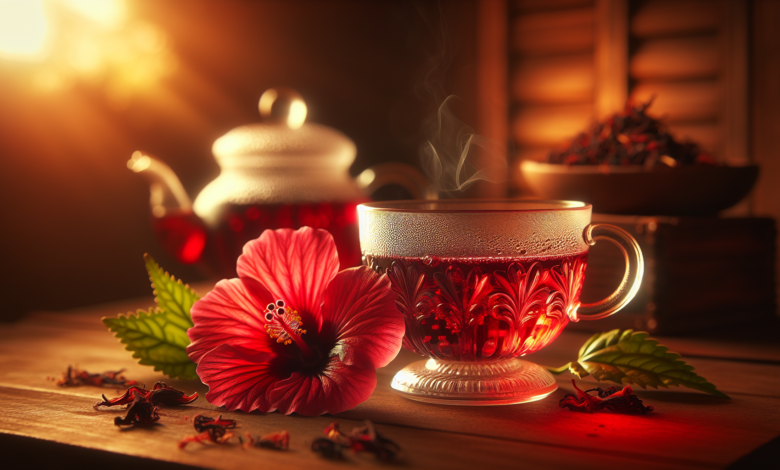The Health Benefits of Hibiscus Tea: A Delicious Herbal Remedy

Hibiscus tea, a vibrant and flavorful beverage, has been cherished for centuries across various cultures. This herbal tea, made from the dried calyces of the hibiscus plant, is not only delicious but also packed with numerous health benefits. In this comprehensive article, we will explore the various ways in which hibiscus tea can improve your overall well-being.
Nutrient-Rich Composition
Vitamins and Minerals
Hibiscus tea is an excellent source of essential vitamins and minerals. It contains vitamin C, which is crucial for maintaining a strong immune system, promoting collagen production, and protecting cells from oxidative stress. Additionally, hibiscus tea provides small amounts of vitamin A, vitamin E, and B vitamins, all of which contribute to various bodily functions.
See also: What Are the Benefits of Overbed Tables for Home Care and Recovery?
Antioxidants
One of the most notable aspects of hibiscus tea is its high antioxidant content. Antioxidants help combat free radicals, which are unstable molecules that can damage cells and contribute to the development of chronic diseases. The primary antioxidants found in hibiscus tea include anthocyanins, flavonoids, and polyphenols.
Cardiovascular Health
Blood Pressure Regulation
Studies have shown that regular consumption of hibiscus tea can help lower blood pressure, particularly in individuals with mild to moderate hypertension. The antioxidants in hibiscus tea, such as anthocyanins, have been found to help relax and dilate blood vessels, thereby reducing blood pressure.
Cholesterol Management
Hibiscus tea may also play a role in managing cholesterol levels. Some studies suggest that drinking hibiscus tea can help lower total cholesterol and LDL (bad) cholesterol while increasing HDL (good) cholesterol. This effect may be attributed to the presence of compounds like polyphenols and flavonoids in the tea.
Digestive Health
Soothing Properties
Hibiscus tea has traditionally been used to soothe digestive issues, such as upset stomach, bloating, and constipation. The tea’s gentle diuretic properties can help promote regular bowel movements and alleviate discomfort associated with digestive disorders.
Gut Microbiome Support
The polyphenols found in hibiscus tea may also contribute to the maintenance of a healthy gut microbiome. These compounds can act as prebiotics, providing nourishment for beneficial gut bacteria, which play a crucial role in digestive health, immune function, and overall well-being.
Weight Management
Metabolism Boost
Drinking hibiscus tea may help support weight management efforts by boosting metabolism. The antioxidants and caffeine-like compounds in hibiscus tea can stimulate the body’s metabolic rate, leading to increased calorie burning and fat oxidation.
Appetite Control
Hibiscus tea may also help regulate appetite and reduce cravings. Some studies suggest that the polyphenols in hibiscus tea can influence the production of hormones involved in hunger and satiety, potentially leading to reduced calorie intake and better weight control.
Immune System Support
Vitamin C Content
As mentioned earlier, hibiscus tea is a good source of vitamin C, a powerful antioxidant that plays a vital role in maintaining a robust immune system. Vitamin C helps stimulate the production and function of white blood cells, which are essential for fighting off infections and diseases.
Antimicrobial Properties
Hibiscus tea has been found to possess antimicrobial properties, meaning it can help combat harmful bacteria and viruses. Studies have shown that hibiscus extract can inhibit the growth of various pathogens, including Escherichia coli, Staphylococcus aureus, and Candida albicans.
Skin Health
Antioxidant Protection
The rich antioxidant content in hibiscus tea can benefit the skin by protecting it from damage caused by free radicals. Free radicals can break down collagen and elastin, leading to premature aging, fine lines, and wrinkles. The antioxidants in hibiscus tea help neutralize these harmful molecules, promoting healthier, more youthful-looking skin.
Hydration and Nourishment
Drinking hibiscus tea can also contribute to better skin hydration and nourishment. The vitamins and minerals present in the valerian tea, such as vitamin C and vitamin A, are essential for maintaining healthy skin cells and supporting the skin’s natural regeneration process.
Stress Relief and Mental Well-being
Calming Effect
Hibiscus tea has a naturally calming effect on the body and mind. The act of sipping on a warm cup of hibiscus tea can promote relaxation, reduce stress levels, and improve overall mood. This calming effect may be attributed to the tea’s aromatic compounds and its ability to promote a sense of tranquility.
Improved Sleep Quality
Consuming hibiscus tea before bedtime may help improve sleep quality. The tea’s calming properties can help relax the body and mind, making it easier to fall asleep and experience more restful slumber. Additionally, the lack of caffeine in hibiscus tea makes it an ideal choice for those who are sensitive to stimulants or prefer to avoid them in the evening.
Preparation and Consumption
Brewing Methods
Hibiscus tea is easy to prepare and can be enjoyed both hot and cold. To brew a cup of hot hibiscus tea, simply steep 1-2 teaspoons of dried hibiscus flowers in boiling water for 5-10 minutes. For a refreshing iced tea, brew a concentrated batch of hot tea and allow it to cool before serving over ice.
Flavor Variations
While hibiscus tea is delicious on its own, it can also be combined with other ingredients to create unique flavor profiles. Popular additions include mint, ginger, cinnamon, and lemon. Experiment with different combinations to find your preferred taste.
Precautions and Considerations
Interactions with Medications
While hibiscus tea is generally safe for most people, it is essential to be aware of potential interactions with certain medications. Hibiscus tea may interfere with the absorption or effectiveness of some drugs, such as those used to treat high blood pressure or diabetes. If you are taking any medications, consult with your healthcare provider before incorporating hibiscus tea into your diet.
Pregnancy and Breastfeeding
Pregnant and breastfeeding women should exercise caution when consuming hibiscus tea. While moderate amounts are likely safe, excessive consumption may have potential risks. It is always best to consult with a healthcare professional to determine the appropriate intake during these stages.
Conclusion
Hibiscus tea is a delightful and health-promoting beverage that offers a wide array of benefits. From supporting cardiovascular health and aiding digestion to boosting the immune system and promoting better skin, hibiscus tea is a natural and enjoyable way to enhance overall well-being. By incorporating this vibrant herbal tea into your daily routine, you can experience its delicious taste and reap the numerous advantages it has to offer.
As with any dietary change or addition, it is essential to listen to your body and consult with a healthcare professional if you have any concerns or pre-existing health conditions. With mindful consumption and an appreciation for its unique qualities, hibiscus tea can become a delightful and beneficial part of your wellness journey.





